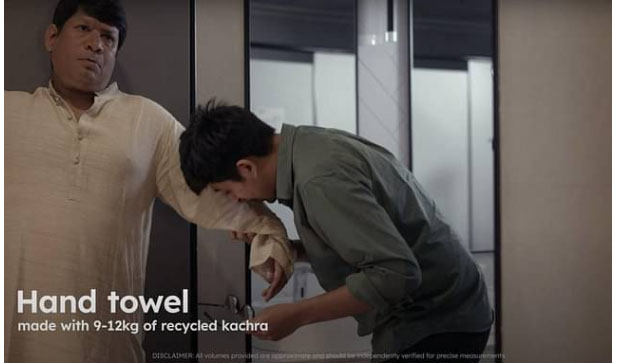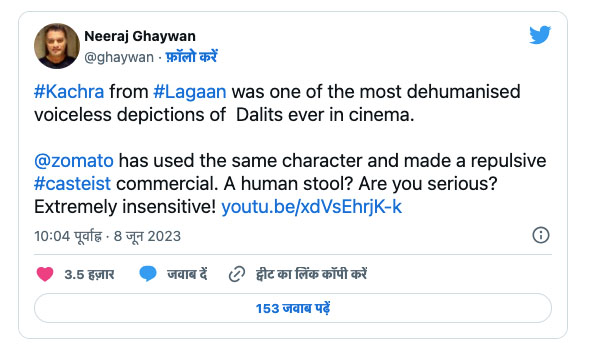Zomato is known for its marketing gimmicks which has often created buzz and had a positive impact on the audience. However, this ‘World Environment Day’ Zomato failed to impress the audience with its “Kachra Bhi Khelega” ad campaign. It was ruthlessly dismissed by the audience for its casteist undertones.

The Infamous “Kachra Campaign”
The advertisement featuring Aditya Lakhia, who played the character “Kachra” in the 2001 Aamir Khan starrer “Lagaan”, is an effective metaphor to represent Kachra or garbage. In the film, Kachra is a marginalised Dalit man who is ostracised from his village due to his caste status. As a result, his real name is never revealed, and other characters use the casteist slur “Kachra” to refer to him.
Content of Advertisement
The ad utilises Kachra’s story to draw attention to the problem of garbage, which is often seen as something worthless and unimportant. It highlights the idea that garbage is not something to be ignored or discarded, but rather something to be valued and respected. The ad emphasises the importance of reducing, recycling and reusing our garbage so that it does not end up in landfills and instead contributes to creating a cleaner and healthier environment.
Intention of Zomato

The ad also serves to remind us of the powerful message of inclusion and acceptance that the film “Lagaan” conveyed. Despite opposition from other team members, Aamir Khan’s character included Kachra in the cricket team, and he eventually helped the team win against the British players. The ad reminds us of the importance of including people from all backgrounds and walks of life in our society, and of the immense potential that can be unlocked when we do so.
Neeraj Ghaywan’s Tweet

The tweet by Neeraj Ghaywan about the commercial by Zomato is spot on. The commercial made by Zomato is insensitive and casteist in nature. It is highly objectionable to use a character from a popular film such as Lagaan and depict the character in an insensitive and dehumanizing light.
Why are People Infuriated?
The character Kachra from Lagaan was a Dalit and was portrayed in a positive and sympathetic light in the film. However, in this commercial, he is depicted as a human stool which is absolutely repulsive and derogatory. It is a clear case of gross insensitivity on the part of the makers of the commercial. It is not only offensive to the Dalit community but also to anyone who respects basic human values. It is an affront to humanity and should be strongly condemned.
What Happened to the AD?
Recycling has become an increasingly important topic in today’s society, as awareness of the environmental impacts of waste increases. The food company in question, in its now-deleted ad on YouTube, claimed it has “recycled 20 million kg of plastic kachra so far”. In the advertisement, kachra was used as a metaphor to represent the potential of plastic waste and the benefits of recycling.
Conclusion
In conclusion, it is highly likely that the ‘Kachra’ advertisement by Zomato was a purposeful and calculated action, potentially sanctioned by the company’s higher-ups. The user’s dissatisfaction with the advertisement and the company is justified, as it perpetuated the notion that the caste system is a valid system in India. It is important that companies are held accountable for their actions and that such attempts to normalize the caste system are not tolerated.
FAQs
1.Why are people infuriated by Zomato’s “Kachra Bhi Khelega” ad campaign?
Zomato’s “Kachra Bhi Khelega” ad campaign had casteist undertones to it which infuriated the audience even more.
2.What was the intention behind Zomato’s ad campaign?
The intention behind Zomato’s “Kachra Bhi Khelega” ad campaign was to draw attention to the problem of garbage and promote the importance of reducing, recycling, and reusing waste to create a cleaner and healthier environment.
3.How does the campaign impact Zomato’s brand image?
Zomato’s brand image was tarnished due to this ad and consumers have already started to boycott the company online (on Twitter) due to the message it tried to convey.
4.What was Zomato’s “Kachra campaign” about?
Zomato wanted to show the importance of recycling and the downsides of wastage. Therefore, they utilized “Lagaan” film’s very famous character “Kachra” to show this which came out to have casteist undertones.
5.How did Zomato react to the backlash?
Following the backlash, Zomato gave an apology and took down the advertisement from every platform. The company said that its intention was not to hurt the sentiments of people.